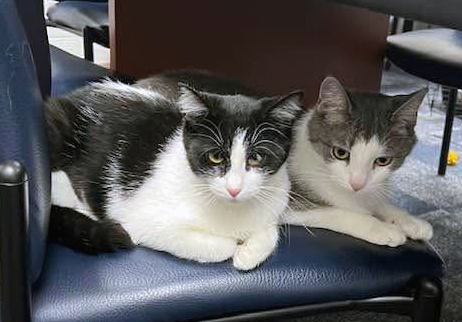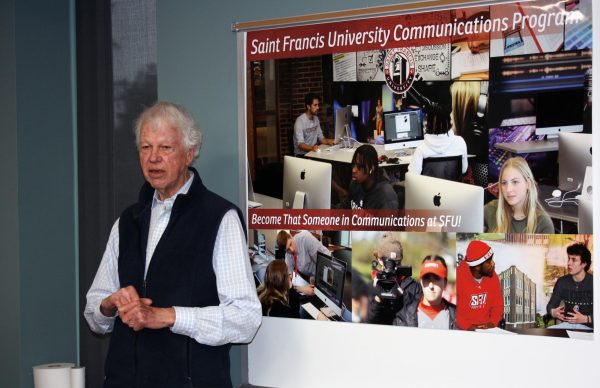PA students outraged over previous drug test screening
Physician Assistant graduate students were frustrated about the way their department handled the last drug test screening on Thursday, Feb. 15.
“People were saying in the room ‘I have to go to the bathroom,’ but they didn’t let you,” said Student 1.
Right before their pharmacology lecture started at eight in the morning, one of the professors announced that the students had to take another drug test. “There were some sketchy temperatures and suspicion,” Student 2 said in reference to the PA professor’s explanation as to why the drug test screening is taking place. The students were not allowed to leave their designated classroom until it was their turn to go to DiSepio and complete the exam.
According to Student 1, the PA department had blocked one of the two doors in the classroom, preventing students from leaving the room. “They took a chair and barricaded it so you could not open the door on the one side.”
What the students thought was going to be a smooth process ended up taking up the majority of the class time. “I went at like 11[a.m.] and this process took until 12:15 [p.m.],” Student 3 said.
Students were not only upset about the duration of the drug test, but many were very uncomfortable when trying to complete the drug test screening.
In a standard drug test, a student is asked to complete the test and is given some privacy as the nurse stands outside of the door. This time a female nurse (for the female students) and a SFU police officer (for the male students) had to physically watch the students complete the drug exam, which prolonged the process.
“People would go in one at a time, but as more people went they got pee shy,” said Student 2. “The cop was watching them and they couldn’t go whether they actually had to go or not.”
Since Student Health has no male nurses, a representative from the SFU police department had to step in.
Student 3 said that taking the drug test screening felt like the main character Piper from the hit Netflix series Orange is the New Black. “Although I am not a criminal and have done no criminal actions, I definitely felt guilty just from how the process was set up.”
Students who could not pee in front of the nurse or cop were escorted to another room. “They put you all in one room,” said Student 1. “[They] restrict you in a room full of people who have to be watched but can’t pee.” The students in the room were allowed two Dixie cups of water.
One of the students in the room was overwhelmed by the stress of having the nurse/cop watching him or her urinate. The student felt that he/she was in a very vulnerable state.
Although several students experienced discomfort while taking the drug test screening, the students who had to wait hours to complete the drug test, because of the backup, began to feel uneasiness.
Because of the distraction from other students going in and out the room and the anticipation of going to the bathroom, students were unable to give their full attention to the guest lecture.
“People were very uncomfortable with a full bladder,” Student 4 said.
According to one of the students, the guest lecture was not aware of the drug test screening. “He was thrown off,” said Student 1. “He was supposed to give us a review at the end [but] he didn’t give us anything to review because he was rushed.”
Associate Professor and Academic Coordinator Carrie Beebout, the professor who informed the students about the drug exam, comments on the subject matter.
“All accredited physician assistant programs are required to conduct such screenings of students so as to ensure that we are not sending individuals who are impaired into healthcare settings,” said Beebout. “In addition, affiliation agreements with clinical sites include requirements that students be screened in order to ensure facility, patient and student safety.”
Beebout stated that, from a faculty standpoint, everything did go as planned. She continued to say that even though the previous drug test had some restrictions, the students remained positive and cooperative.
One of the students stated that the drug exam restricted his/her human rights of going to the bathroom. Beebout commented that in a real hospital setting, it is not uncommon for a PA to be in an operating room for a long period of time without going to the bathroom.
“Many practices schedule patients back-to-back so that it can be difficult to even take a bathroom break for several hours,” said Beebout. “The difference is that nobody will be telling them that they can’t use the bathroom.”
When addressing Student 1’s comment about only testing the individuals whose test results deemed questionable, Beebout responded that the method of which they conducted the drug exam could not allow them to pinpoint the suspicious drug test to the individual; therefore, the department had to repeat the drug exam as a whole.
Beebout also responded to Student 1’s comment about the guest lecture not being aware of the drug exam. Beebout stated that he was aware of the drug test screening and was in support of making sure the students are well prepared to become future prescribers.
“In an effort to eliminate students missing valuable lecture time in the future, we will consider scheduling each urinalysis during a time when class is not in session,” said Beebout.
The department and Beebout are aware of the students’ complaints and acknowledge the discomfort many of the students felt when completing the drug exam.
“We do recognize that this was an issue for some students, and so we have already developed measures that we will put into place to alleviate this problem in the future.”




